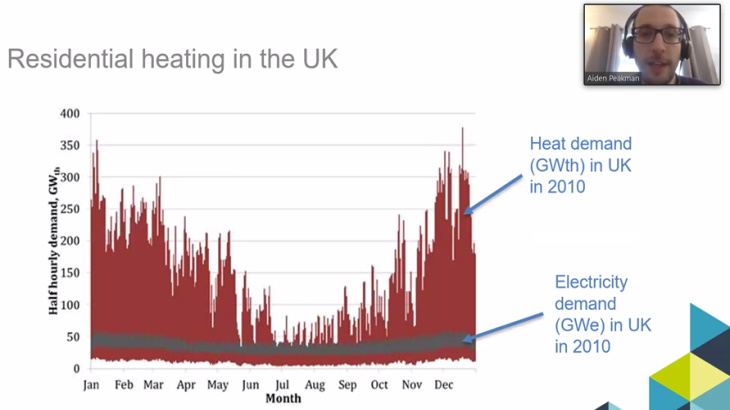It is likely that multiple technologies will need to be developed and deployed to decarbonise heat demand, but nuclear can play a part in both the industrial and domestic sectors, Peakman told the High-Level Workshop on the Outlook for Nuclear Power in Clean Energy Transitions on 3 March. Collaboration between countries and via multi-national organisations can help to develop suitable country-specific options, he said. These could include heat pumps, district heating systems and hydrogen.
In the UK, some 37% of carbon emissions are associated with heat demand, Peakman said, with 14% from industrial heat and the remainder from cooking, hot water and space heating and cooling. However, the demand for residential heat in the UK shows large fluctuations between summer and winter. Such large fluctuations in heat demand would be difficult for a system dominated by heat pumps to cope with, he said. UK electricity demand does not fluctuate in the same way, he noted.
District heating has been widely deployed in some countries, such as Finland, where it meets about 40% of domestic heat demand, but less so in others, such as the UK, where only around 2% of heat demand is provided in this way. Other options could include large, megawatt-scale heat pumps connected to a heat network; hybrid heat pumps, with a low-carbon source helping the heat pump to meet demand peaks; hydrogen, which could be used via existing gas networks - with some modifications - to power boilers in homes or in industrial applications.
Many countries have experience of utilising nuclear heat in non-power applications, Peakman said, citing examples in Canada, where nuclear heat has been supplied to industrial parks near to power plants; Norway's Halden reactor, which supplied heat for use in paper and pulp production; Kakzakhstan's BN-350 liquid metal fast reactor, for desalination; Germany's Stade plant, which supplied process heat to a salt refinery, and Switzerland's Gosgen, which supplied heat to a cardboard factory. Heat produced at the UK's first nuclear power plant - Calder Hall, which operated from 1956 to 2003 - also delivered heat to the Sellafield site.
"Heat demand is a very challenging area - but if we don't address that demand and decarbonise it, it will be very difficult to achieve global greenhouse gas emission targets," Peakman said. "There is certainly a role that current generation [reactors] and advanced reactors can play."
NIRO is hosted by the UK National Nuclear Laboratory.















